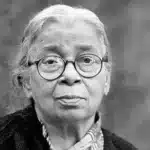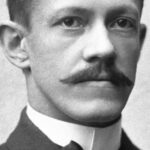Archer Martin (1 March 1910 – 28 July 2002) was a British chemist. He was awarded the Nobel Prize in Chemistry in 1952.
Life and Career
Archer Martin was born on March 1, 1910, in London, England. He grew up in a scientific family, as his father was a physician. Martin developed an early interest in science, particularly chemistry, which eventually led him to pursue a career in the field.
Martin attended the Bedford School and later studied chemistry at the University of Cambridge. He earned his bachelor’s degree in 1932 and continued his studies at Cambridge, completing his Ph.D. in 1936 under the supervision of James Irvine. After completing his education, Archer Martin joined the Wool Industries Research Association (WIRA) in Leeds, where he began his groundbreaking work on chromatography. In collaboration with his colleague Richard Synge, Martin developed partition chromatography, a technique that used a liquid-liquid system to separate and analyze complex mixtures of organic compounds.
Their work on chromatography led to the publication of a landmark paper in 1941, and in 1952, Martin and Synge were jointly awarded the Nobel Prize in Chemistry for their development of partition chromatography. This technique revolutionized analytical chemistry, enabling scientists to separate and identify complex mixtures with unprecedented precision.
After receiving the Nobel Prize, Martin continued his research and held various academic positions. He became the Head of the Biochemistry Division at the National Institute for Medical Research in London in 1952. Later, he served as a professor at the University of St. Andrews from 1954 to 1963. He passed away on July 28, 2002, at the age of 92, in Llangarron, Herefordshire, England.
Award and Legacy
Archer Martin, along with his colleague Richard Synge, was awarded the Nobel Prize in Chemistry in 1952 for their development of partition chromatography. This recognition highlighted the significant impact of their work on analytical chemistry, particularly in the separation and analysis of complex mixtures of organic compounds.
Martin’s work laid the foundation for modern analytical techniques, enabling scientists to separate and analyze complex mixtures with unprecedented precision. Chromatography has become an indispensable tool in laboratories worldwide, with applications ranging from pharmaceuticals and biochemistry to environmental analysis.
The principles of chromatography developed by Martin have been extended and adapted to various chromatographic techniques, including gas chromatography and high-performance liquid chromatography (HPLC). These techniques are widely used in research, quality control, and industrial processes.
Martin’s approach to scientific research, characterized by collaboration and innovative thinking, serves as an inspiration for future generations of scientists. His ability to apply scientific principles to real-world problems has influenced the methodology of many researchers in the field. Throughout his career, Archer Martin contributed to the education and training of future scientists. His teachings and mentorship have had a lasting impact on the development of analytical chemists and researchers. Besides the Nobel Prize, Martin received numerous other awards and honors for his contributions to science. These recognitions serve as a testament to the enduring significance of his work.












